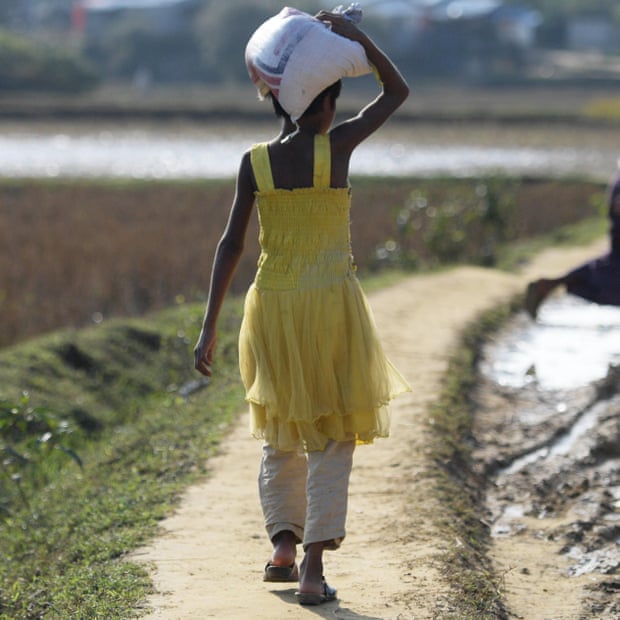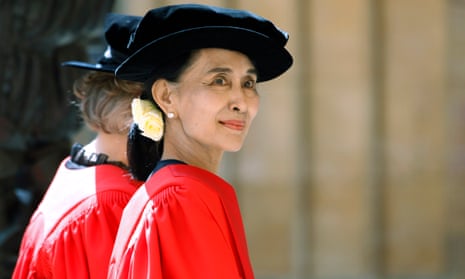Aung San Suu Kyi is to be stripped of the Freedom of the City of Oxford, where she studied as an undergraduate, over her response to the Rohingya crisis.
Oxford city council voted unanimously to support a cross-party motion that said it was “no longer appropriate” to celebrate the de facto leader of Myanmar. The council is to hold a special meeting to confirm the honour’s removal on 27 November.
The council leader, Bob Price, supported the motion, reportedly calling it an “unprecedented step” for the local authority, according to the BBC.
In recent months, Aung San Suu Kyi has drawn increasing criticism for her apparent defence of Myanmar’s treatment of its Rohingya minority, described by the UN as a “textbook example of ethnic cleansing”.
Q&AWho are the Rohingya and what happened to them in Myanmar?
Show

Described as the world’s most persecuted people, 1.1 million Rohingya people live in Myanmar. They live predominately in Rakhine state, where they have co-existed uneasily alongside Buddhists for decades.
Rohingya people say they are descendants of Muslims, perhaps Persian and Arab traders, who came to Myanmar generations ago. Unlike the Buddhist community, they speak a language similar to the Bengali dialect of Chittagong in Bangladesh.
The Rohingya are reviled by many in Myanmar as illegal immigrants and suffer from systematic discrimination. The Myanmar government treats them as stateless people, denying them citizenship. Stringent restrictions have been placed on Rohingya people’s freedom of movement, access to medical assistance, education and other basic services.
Violence broke out in northern Rakhine state in August 2017, when militants attacked government forces. In response, security forces supported by Buddhist militia launched a “clearance operation” that ultimately killed at least 1,000 people and forced more than 600,000 to flee their homes. The UN’s top human rights official said the military’s response was "clearly disproportionate” to insurgent attacks and warned that Myanmar’s treatment of its Rohingya minority appears to be a "textbook example” of ethnic cleansing.
When Aung San Suu Kyi rose to power there were high hopes that the Nobel peace prize winner would help heal Myanmar's entrenched ethnic divides. But she has been accused of standing by while violence is committed against the Rohingya.
In 2019, judges at the international criminal court authorised a full-scale investigation into the allegations of mass persecution and crimes against humanity. On 10 December 2019, the international court of justice in The Hague opened a case alleging genocide brought by the Gambia.
Oxford council bestowed the freedom of the city on her in 1997, when she was being held as a political prisoner by Myanmar’s military junta.
The decision to remove the award comes after the Oxford college where Aung San Suu Kyi studied recently removed her portrait from public display.
The governing body of St Hugh’s college decided to remove the painting of the Nobel laureate from its main entrance.
A number of British institutions say they are reviewing or removing honours bestowed on Aung San Suu Kyi during her campaign for democracy.
Unison, the UK’s second largest trade union, announced last month that it would suspend Aung San Suu Kyi’s honorary membership and urged her to do more to denounce the plight of the Rohingya people.
Bristol University, one of a string of universities that awarded honorary degrees to the Burmese leader during her time in opposition, also said it was reviewing its award in light of accusations of brutal mistreatment of the Rohingya.
The London School of Economics student union said it would be stripping Aung San Suu Kyi of her honorary presidency.
As a leader of Myanmar’s opposition, Aung San Suu Kyi won international praise and a Nobel peace prize in 1991. Despite being barred from running for president, she won a decisive victory in the country’s 2015 election, and was eventually given the title of state counsellor.
Meanwhile, a major fundraising appeal has been launched to help the hundreds of thousands of people fleeing violence in Burma.
The 13 member charities who make up the Disasters Emergency Committee (DEC) took action to step up their humanitarian relief as more than half a million people sought medical care, food and sanctuary.
The majority have been Muslim Rohingya people, who have fled to Bangladesh amid atrocities and fatalities in Rakhine state, on Mayanmar’s western coast, following clashes between insurgents and security forces in recent weeks.
The UK government has pledged to match the first £3m donated by the public to the DEC emergency appeal.
- To make a donation to the DEC appeal click here.

Comments (…)
Sign in or create your Guardian account to join the discussion